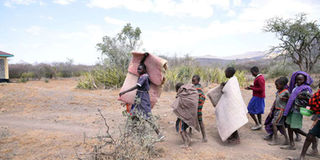Pastoralists need affirmative action

Pupils collect their bedding after class at Akwichatis, Baringo County on February 2, 2017. Pupils from nomadic communities were put in boarding schools to reduce school dropout rate. PHOTO | FILE | NATION MEDIA GROUP
What you need to know:
- Article 27(1) states that “every person is equal before the law and has their right to equal protection and equal benefit from the law”.
- They continue to suffer low literacy levels, high unemployment rates, and a feeling of marginalisation.
- It is such feelings that have been exploited by terrorist groups to lure unsuspecting youth into radicalisation and terror cells.
Despite the considerable progress made since independence to increase the number of trained teachers, there is a big shortage in the nomadic counties, making them net importers from other regions. This is so and yet the Constitution of Kenya, 2010 reaffirms all the citizens’ right to basic services such as education.
This is also upheld in other policy documents, including the sessional papers, national strategic plans and the Mid-term Expenditure Framework.
Article 27(1) states that “every person is equal before the law and has their right to equal protection and equal benefit from the law”.
In Article 27 (6), the Constitution places the burden of realising the universal right to non-discrimination on the State through legislative or other steps, including affirmative action and policies.
AFFIRMATIVE ACTION
Article 56 (b) says that “the state shall put in place affirmative action programmes designed to ensure that minorities and marginalised groups are provided with special opportunities in education and economic fields”.
Therefore, the need for concerted efforts to have universal access to basic education, improving completion and quality in Early Childhood Development Education (ECDE), primary and secondary education for nomadic and other marginalised communities cannot be overemphasised.
They continue to suffer low literacy levels, high unemployment rates, and a feeling of marginalisation. It is such feelings that have been exploited by terrorist groups to lure unsuspecting youth into radicalisation and terror cells.
TERRORISM
The long history of tension between residents and the State on issues of insecurity, cattle rustling and terrorism and conflicts over resources, have led many to question the commitment to their welfare, as they have been made to feel like second-class citizens.
The education system, which is meant to be an equalising and socialisation agent, does not take into account the peculiar difficulties these communities face.
Owing to the rampant insecurity in the nomadic and border regions, many schools have been shut for prolonged periods, while students in other parts are learning.
Yet they sit the same exams, which determine vocational and professional development and advancement in higher education. The nomadic people are disadvantaged.
LITERACY RATES
The Teachers Service Commission requirement for P1 entry of C-plain is unfair and has failed to address the challenges in the nomadic areas, leading to poor and falling teacher-pupil ratios. The distribution of adult teachers is also skewed heavily in favour of counties that have high adult literacy rates.
For example, in 2012, 18 adult literacy teachers were posted to Mandera County, with an adult literacy rate of 10 per cent, while 93 were sent to Kiambu, with an adult literacy rate of 90 per cent.
The nomadic regions suffers peculiar challenges that need to be taken into account if the historical and environmental vagaries are not to be aggravated.
Also, due to their proximity to lawless border regions that have seen an influx of guns and bandits from chronically unstable neighbouring countries such as Somalia and South Sudan and Ethiopia, these areas are unattractive to professionals.
CULTURAL CONTEX
Following attacks in Baringo and Mandera, for example, teachers deserted in droves, leading to plummeting education standards. There are reasons why there are not enough teachers. First, very few locals meet the high qualifications set for teacher trainee recruitment in government training colleges.
Second is the inappropriate social and cultural context. Third, planning for education services, including the provision of teachers does not adequately consider the unique characteristics.
Due to this harsh reality, some affirmative action in education is long overdue. To solve this perennial problem, Education Cabinet Secretary Amina Mohamed has, in consultation with the leaders of nomadic counties, considered the possibility of lowering the entry grades to some courses to make up for theses disadvantages.
ACCESS EDUCATION
There is a proposal to lower the admission into the P1 teachers’ course from a C plain to D+ as an aspect of affirmative action.
This could be institutionalised through the Kenya National Qualification Authority. Such a long-overdue move would be laudable and most salutary.
The commission should ensure that citizens in Asal areas get an equal opportunity to access education and compete for the opportunities available to their counterparts in the rest of the country.
Mr Ahmed a public relations executive based in Nairobi. [email protected]




